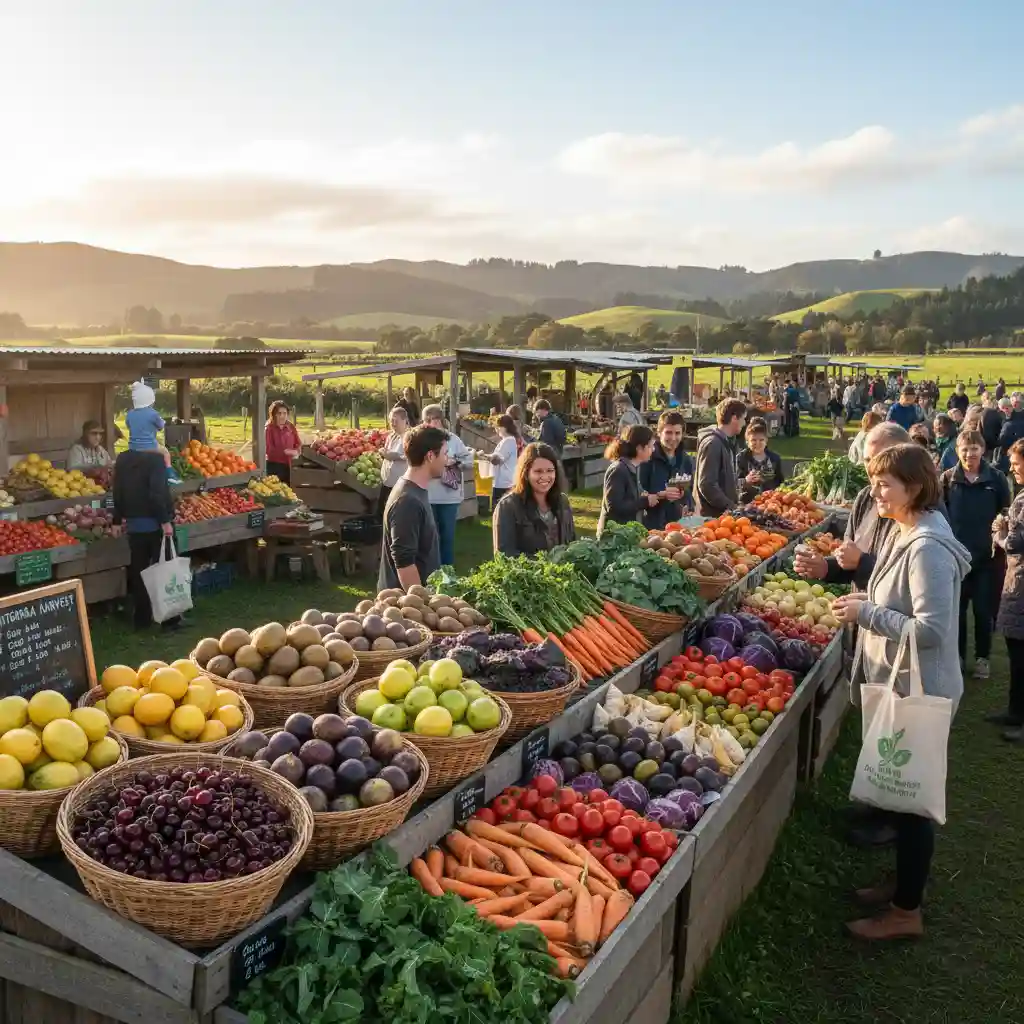Eco-Friendly Kitchen Swaps for a Waste-Free Lifestyle
Welcome to the heart of your home, the kitchen! It’s a place of nourishment, creativity, and unfortunately, often a significant source of household waste. But what if we told you that transforming your kitchen into an eco-friendly, waste-free haven is simpler than you think?
As a hub for sustainable living in New Zealand, we understand the journey from awareness to action. This comprehensive guide will empower you with practical, impactful eco-friendly kitchen swaps that align with a waste-free lifestyle, contributing positively to our beautiful Aotearoa.
Why Make the Switch to an Eco-Friendly Kitchen?
The motivation behind adopting eco-friendly kitchen swaps extends beyond personal preference. It’s about contributing to a healthier planet, fostering a safer home environment, and often, saving money in the long run.
“Every small swap in your kitchen helps reduce your ecological footprint, moving us closer to a truly waste-free lifestyle.”
Consider the impact:
- Environmental Stewardship: Reducing single-use plastics and food waste significantly lessens landfill burden and greenhouse gas emissions.
- Healthier Living: Many traditional kitchen products contain chemicals or plastics that can leach into food and the environment. Eco-friendly alternatives often mean fewer toxins.
- Economic Benefits: While some initial investments might be higher, reusable items like silicone bags or solid dish soap can save you money over time compared to their disposable counterparts.
Stat Callout: New Zealanders send approximately 15.5 million tonnes of waste to landfills each year, with a significant portion originating from households. Making eco-friendly kitchen swaps directly tackles this issue!
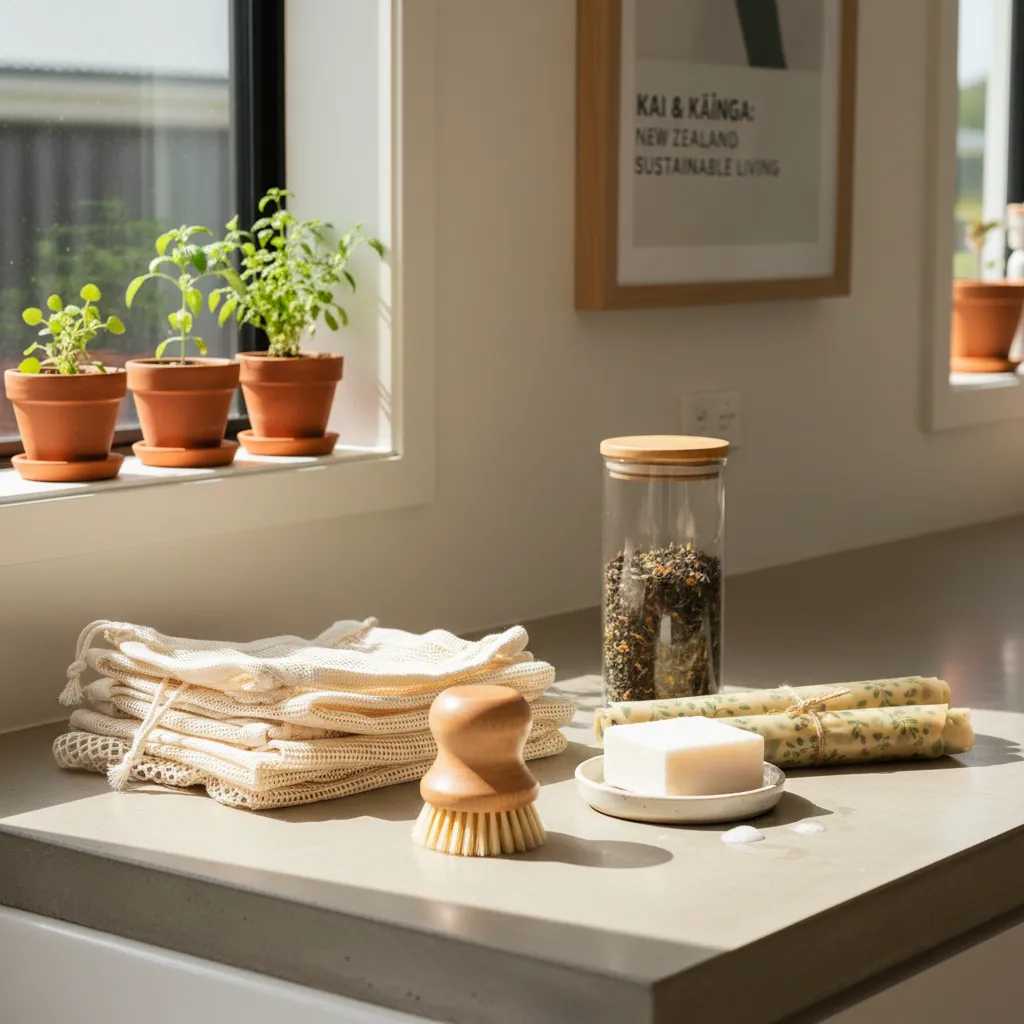
Essential Eco-Friendly Swaps for Your Kitchen
Let’s dive into the specifics! Here are key areas where you can implement impactful eco-friendly kitchen swaps, moving you closer to a waste-free lifestyle.
Food Storage Solutions
- Swap Plastic Wrap for Beeswax Wraps or Silicone Lids: Beeswax wraps are breathable, reusable, and compostable, while silicone lids offer a durable, air-tight seal for bowls and containers.
- Replace Ziploc Bags with Reusable Silicone Bags: Perfect for freezing, meal prep, and storing snacks. They’re durable, washable, and last for years.
- Opt for Glass Containers over Plastic: Glass is non-porous, doesn’t leach chemicals, and is easily recyclable. Ideal for leftovers and packed lunches.
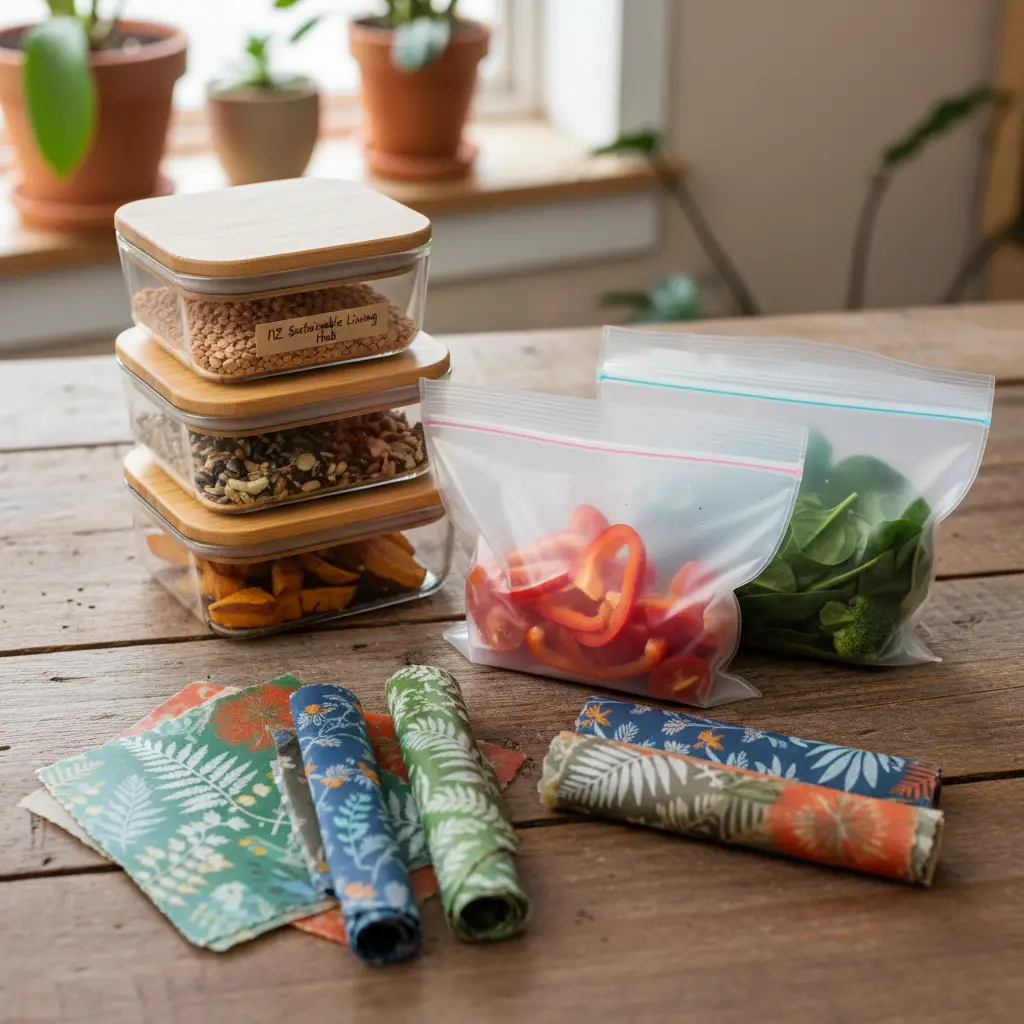
Eco-Conscious Cleaning Essentials
- Switch to Reusable Cloths & Sponges: Ditch disposable paper towels for washable cotton cloths, and plastic sponges for compostable loofahs or wooden brushes with natural bristles.
- Embrace Solid Dish Soap & Refillable Cleaners: Bar soap for dishes eliminates plastic bottles, and many brands offer concentrated refills for all-purpose cleaners, reducing packaging waste.
- DIY Cleaning Solutions: Simple ingredients like vinegar, baking soda, and essential oils can create powerful, non-toxic cleaners for almost every kitchen surface.
Smart Shopping & Meal Prep
- Carry Reusable Produce Bags: Say goodbye to those flimsy plastic bags at the supermarket. Bring your own mesh or cloth bags for fruits and vegetables.
- Buy in Bulk: Utilise bulk bins for grains, nuts, spices, and even liquids (like oils or detergents) using your own containers. Many New Zealand stores support this.
- Plan Your Meals: Reduce food waste by planning your meals, creating a shopping list, and only buying what you need.
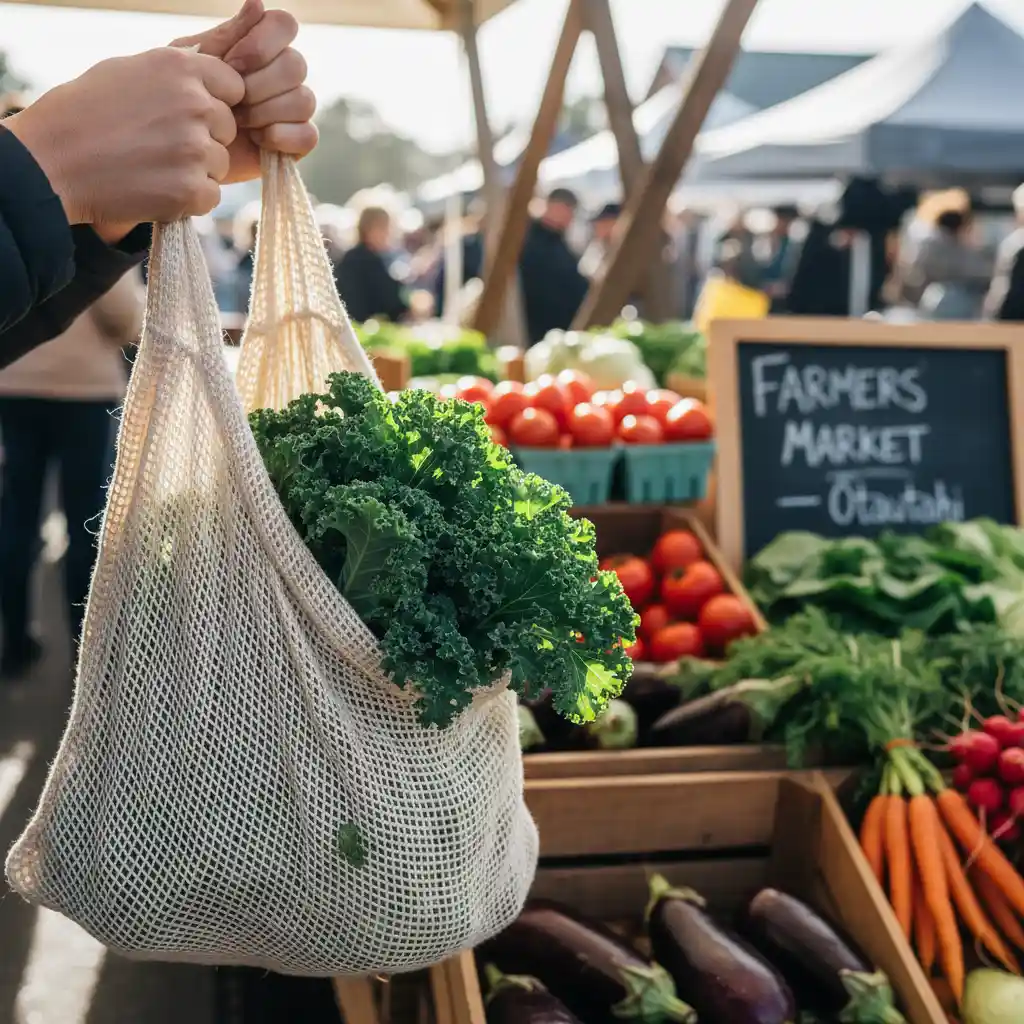
Sustainable Cooking & Dining Habits
- Choose Durable Cookware: Invest in high-quality cast iron, stainless steel, or ceramic cookware that lasts a lifetime, reducing the need for frequent replacements.
- Reusable Coffee Pods & Tea Infusers: For coffee and tea lovers, these eliminate single-use pods and tea bags (many of which contain plastic).
- Opt for Reusable Napkins & Straws: Cloth napkins are washable and elegant, while stainless steel or bamboo straws are great alternatives to plastic.
Optimising Waste Management
- Start Composting: Divert food scraps and garden waste from landfills. This creates nutrient-rich soil for your garden and drastically reduces your waste bin volume.
- Understand Your Recycling: Familiarise yourself with what your local council recycles. Rinse containers and remove lids where required to ensure effective recycling.
- Minimise Food Waste: Get creative with leftovers, store food properly to extend its life, and understand ‘best before’ vs. ‘use by’ dates.
Stat Callout: An average New Zealand household throws away approximately 122 kg of food per year. Composting and smart meal planning can dramatically cut this down, saving both resources and money.
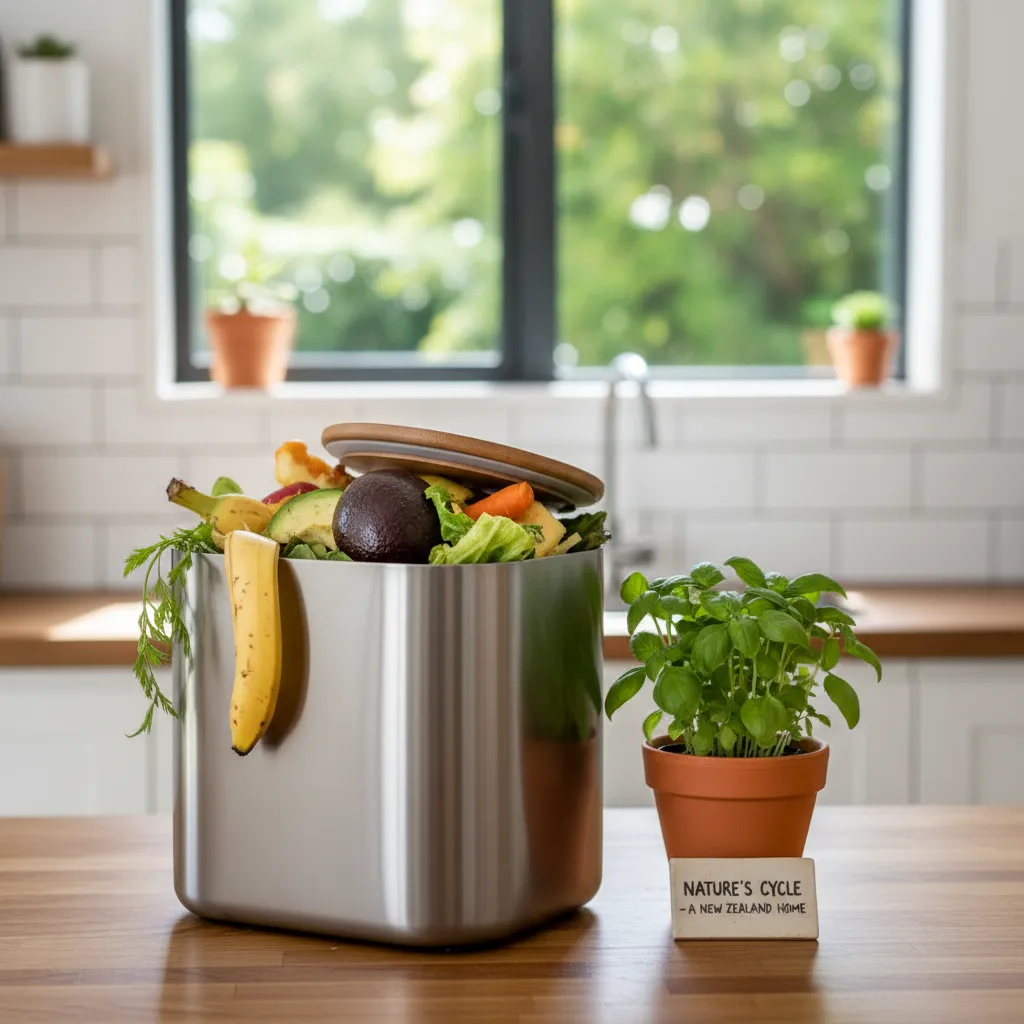
Making the Transition: Tips for Success
Embarking on a waste-free kitchen journey doesn’t have to be overwhelming. Here’s how to make it manageable and enjoyable:
- Start Small: Pick one or two eco-friendly kitchen swaps to begin with, like reusable bags or a compost bin. Master those, then add more.
- Use What You Have First: Don’t throw away perfectly good plastic containers just to replace them. Use them until they can no longer serve a purpose, then replace with a sustainable alternative.
- Educate Yourself: Learn about local recycling rules, composting methods, and where to find bulk or sustainable products in your area.
- Involve the Family: Make it a collective effort! Educating children and partners about the ‘why’ behind these swaps can create lasting habits.
- Be Patient and Persistent: It’s a journey, not a destination. There will be slip-ups, but consistency over perfection is key.
Your Eco Kitchen Action Checklist
Ready to make an impact? Here’s a quick checklist to kickstart your eco-friendly kitchen transformation:
- ✔ Replace plastic wrap with beeswax wraps or silicone lids.
- ✔ Invest in reusable silicone bags for storage.
- ✔ Swap plastic containers for glass alternatives.
- ✔ Ditch paper towels for reusable cloths.
- ✔ Try solid dish soap or refillable cleaning concentrates.
- ✔ Bring reusable produce bags to the grocery store.
- ✔ Explore bulk buying options.
- ✔ Start a home composting system.
- ✔ Commit to reducing food waste through meal planning.
Frequently Asked Questions (FAQ)
Are eco-friendly kitchen swaps more expensive?
Initially, some eco-friendly products might have a higher upfront cost than their disposable counterparts. However, because they are designed for reuse and longevity, they typically offer significant cost savings over time. For example, one set of reusable silicone bags can replace hundreds of single-use plastic bags.
How do I properly clean and maintain reusable items like beeswax wraps or silicone bags?
Beeswax wraps should be gently wiped with cool, soapy water and air-dried; avoid hot water or harsh scrubbing. Silicone bags can generally be washed with warm, soapy water or even put in the dishwasher (check manufacturer instructions). Proper care ensures their longevity and hygiene.
What if my local council doesn’t offer food waste collection or composting services?
No problem! You can easily start a small home composting system. Options include worm farms (vermicomposting), bokashi composting (an anaerobic fermentation process), or a traditional compost bin in your garden. These methods are effective for managing food scraps directly at home.
Where can I find these eco-friendly kitchen products in New Zealand?
Many New Zealand-based online stores specialize in sustainable products. You can also find items at local farmers’ markets, health food stores, zero-waste shops, and even some larger supermarkets are expanding their eco-friendly ranges. Look for local bulk food stores for refillable options.
References & Sources
- Ministry for the Environment. (2022). Waste and recycling in New Zealand. Retrieved from environment.govt.nz/facts-and-science/waste-and-recycling/
- WasteMINZ. (2021). Aotearoa New Zealand National Food Waste Report. Retrieved from wasteminz.org.nz/resources/publications/food-waste-report-2021/
- Sustainable Coastlines. (Ongoing). Plastic pollution facts and figures. Retrieved from sustainablecoastlines.org/our-work/plastics/
- Zero Waste International Alliance. (Ongoing). Zero Waste Definition and Principles. Retrieved from zwia.org/zero-waste-definition/
